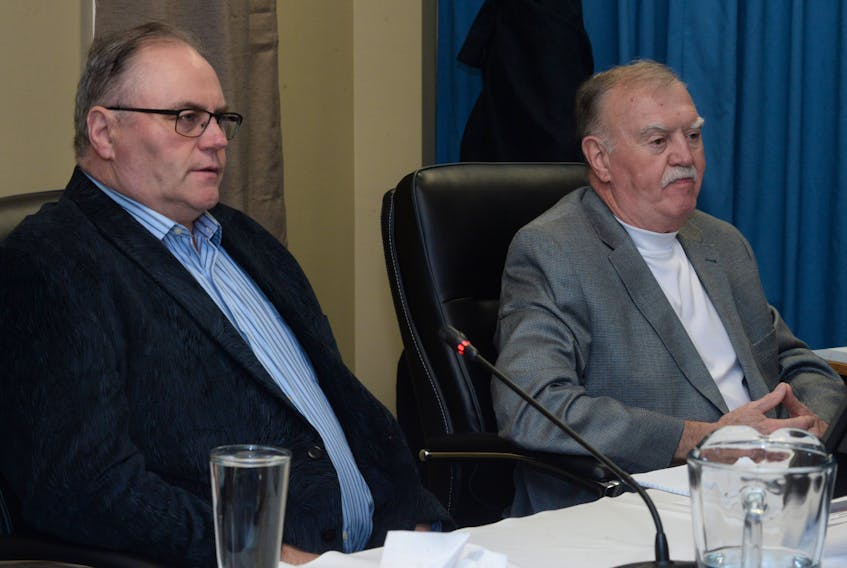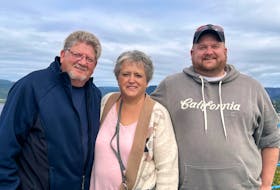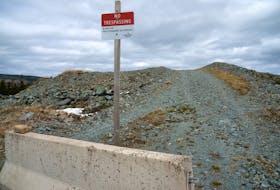ST. JOHN'S, N.L. — The Muskrat Falls Inquiry heard complaints about labour relations on the construction megaproject Monday, with testimony from witnesses representing the Newfoundland and Labrador Building and Construction Trades Council and the Resource Development Trades Council (RDTC).
Witnesses Tom Walsh and Pat McCormick sat together on the stand, and were asked about the construction work under special project orders under the Labour Relations Act. Both men referred back to past megaprojects in the province under the unique labour arrangements — work on the Hebron offshore oil project at Bull Arm, and the build of Vale’s nickel processing plant at Long Harbour.
The Long Harbour project was under a special project order, with the key agreement by the unions that construction workers would not strike during the build.
But a wildcat strike happened during that project, with many workers who walked off the site citing a list of unaddressed grievances.
The strike was highly publicized, costly, and included subsequent, bitter legal battles, with the unions making it clear a positive and productive work site would require all sides not letting problems linger.
“After the strike, or whatever happened out in Long Harbour, whatever you want to call that, the RDTC sort of changed its position that instead of immediately filing a (formal) grievance that there’d be putting more effort into resolving issues,” Walsh told the Muskrat Falls Inquiry.
“That’s the way we finished off in Long Harbour; that’s the way we were doing things in Hebron and that was essentially the intention of how to manage things at Muskrat falls. But they dragged everything out in Muskrat Falls. I think their feeling was if they left something long enough that they would forget about it,” he said, claiming labour relations have been “very difficult” on the project.
"...they dragged everything out in Muskrat Falls. I think their feeling was if they left something long enough that they would forget about it." — Tom Walsh
Walsh said, at times, union reps believed issues were resolved, only to have the Muskrat Falls Employers’ Association reject a proposed resolution. Walsh said he personally believed disputes went on unnecessarily at times, hitting worker morale and affecting everything from job satisfaction to turnover. As an example, he said there was an issue raised in January 2018 with how meal allowances were being covered. He didn’t see it as a major issue himself, but told Commissioner Richard LeBlanc it took seven months to settle out.
“With regards to Hebron and Long Harbour it was a lot better there,” he said, explaining “things didn’t linger” and even if answers weren’t in the employees’ favour, at least there was an answer provided.
Documents entered into evidence at the Inquiry included a list of grievances filed as of December 2015. There were 150 grievances at that time, with 73 settled, 36 abandoned, and others at various stages of dispute resolution. Another document stated total numbers for March 2013 to April 2019. The RDTC reported, 297 grievances were filed in that period, with 124 referred to arbitration.
Worker complaints are varied, but include allegations of non-union hires, inappropriate discipline by employers, failure by an employer to pay appropriate wages and benefits, and unfair dismissals.
At the Inquiry, witnesses described other complaints, including complaints related to the Muskrat Falls accommodations. Sand built up on stairwells at times, they said, acting as a slip and fall hazard. In other cases, when worker numbers ran high and camps were filled, rooms were not properly cleaned to the point where a damp towel would turn black if run along the floor of a room.

Were complaints actually filed? “Always,” Walsh said, noting there has been an improvement in the camps as worker numbers have dropped.
McCormick said he believed the cleanliness of accommodations for the larger, Churchill Falls project was better than what workers have experienced at Muskrat Falls. At the same time, he gave a positive review for the food service.
Earlier in the day, another witness, David Wade, reported complaints he felt went without proper response. He was involved early on — part of negotiating the collective agreement for the 16 trade union locals under the umbrella of the RDTC.
Wade’s lawyer Dana Lenehan asked his client about the presence of non-union contractors. It was something Wade said he raised with the employers’ representatives and the Labour Relations Agency.
“It wasn’t the fact that they were non-union contractors,” he said, saying all contractors at the site had to abide by the project agreement, and the agreement stated the contractors would need to employ people who had union local referrals at the very least.
“But they brought people who didn’t have referrals form the local unions and were not members of the local unions,” he said.
He said he asked at one point for a check at the security gate, to prevent non-union workers from entering the construction site, but testified no action was taken on the issue, before he retired in July 2014.
Twitter: @TeleFitz
RELATED:









